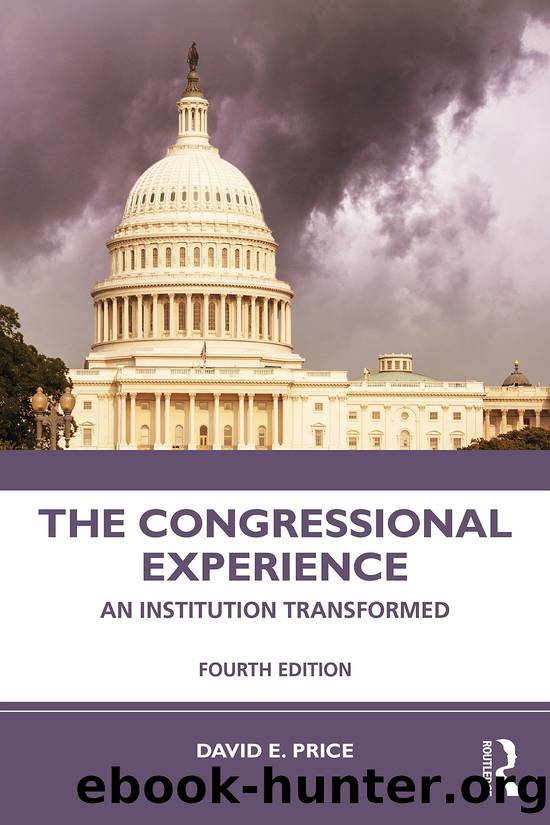The Congressional Experience by David Eugene Price

Author:David Eugene Price [Price, David Eugene]
Language: eng
Format: epub
Tags: Political Science, General
ISBN: 9780429963087
Google: 5x-yDwAAQBAJ
Goodreads: 40140658
Publisher: Routledge
Published: 1992-01-01T00:00:00+00:00
Partisan and Bipartisan Capacity
The late congressional scholar Barbara Sinclair was an insightful observer of the House who based much of her work on intensive interviews with members and staff; I still miss our annual debriefs. Not long after I saw my home equity loan disclosure and Advanced Technological Education bills to passage, largely in classic a-bill-becomes-a-law fashion (see Chapter 5), Sinclair was noting the increasing prevalence of âunorthodox lawmakingâ that departed from the textbook process in major ways. âThe gap between the legislative process that I observe and the process described in U.S. government textbooks,â she declared, âhas become a chasm.â31
Bills were increasingly being referred to multiple committees in ways that increased member participation but also required leadership mediation. Omnibus bills were becoming more common, especially for appropriations. Leadership was taking a more decisive hand in drafting and scheduling legislation, as well as in negotiating House-Senate differences formerly left to conference committees. Attempts to amend bills on the floor proliferated, as did special rules designed to control the amending process. While these changes often promised inclusion, transparency, and efficiency, their overall effect was to make the legislative process more complicated, cumbersome, and difficult to navigate.
The explanations for these changes range widelyâfrom the increasing desire of members to make an individual mark, to institutional reforms and changes (especially by Democrats in the mid-1970s and after the Republican takeover in 1995), the establishment of the budget process, and technological changes such as electronic roll-call voting and televised proceedings. But Sinclair increasingly came to focus on âthe increase in partisan polarization â¦. both as a root cause and as a shaper of the forms that changes with other origins have taken.â32 The institutional results included weakened committees and more centralized party leadership, exerting itself at every stage of the legislative process.
The polarization that led to a more convoluted and contentious legislative process and pervasive leadership intervention also shifted power and responsibility to the executive, giving the president a more prominent, if not necessarily more efficacious, policy role. The prevalence of end-game politics pulls the president into negotiations and mediations among congressional leaders. And as presidents see their legislative priorities run afoul of gridlock, they are more likely to utilize executive orders, presidential memoranda, Statements of Administration Policy (SAPs), and other such tools to bypass the congressional process. President Obamaâs 2012 order shielding âDreamersâ from deportation was a perfect exampleâalthough he readily acknowledged that legislation would have been preferable and saw his order reversed soon after Donald Trump took office.
What do we conclude as to the overall legislative capacity of Congress and of the House in particular? We are not the first, of course, to raise the question of capacity or to relate it to how the parties function. I received my training as a political scientist while there was still a lively debate in academic circlesâwhich found resonance among Richard Bolling and other House reformers in the 1970sâabout the need for more coherent, programmatic, âresponsibleâ parties in American politics. In retrospect, we are reminded to âbe careful what you wish for.
Download
This site does not store any files on its server. We only index and link to content provided by other sites. Please contact the content providers to delete copyright contents if any and email us, we'll remove relevant links or contents immediately.
The Secret History by Donna Tartt(19090)
The Social Justice Warrior Handbook by Lisa De Pasquale(12190)
Thirteen Reasons Why by Jay Asher(8910)
This Is How You Lose Her by Junot Diaz(6887)
Weapons of Math Destruction by Cathy O'Neil(6281)
Zero to One by Peter Thiel(5802)
Beartown by Fredrik Backman(5754)
The Myth of the Strong Leader by Archie Brown(5508)
The Fire Next Time by James Baldwin(5446)
How Democracies Die by Steven Levitsky & Daniel Ziblatt(5219)
Promise Me, Dad by Joe Biden(5153)
Stone's Rules by Roger Stone(5088)
A Higher Loyalty: Truth, Lies, and Leadership by James Comey(4964)
100 Deadly Skills by Clint Emerson(4926)
Rise and Kill First by Ronen Bergman(4789)
Secrecy World by Jake Bernstein(4753)
The David Icke Guide to the Global Conspiracy (and how to end it) by David Icke(4720)
The Farm by Tom Rob Smith(4514)
The Doomsday Machine by Daniel Ellsberg(4490)
